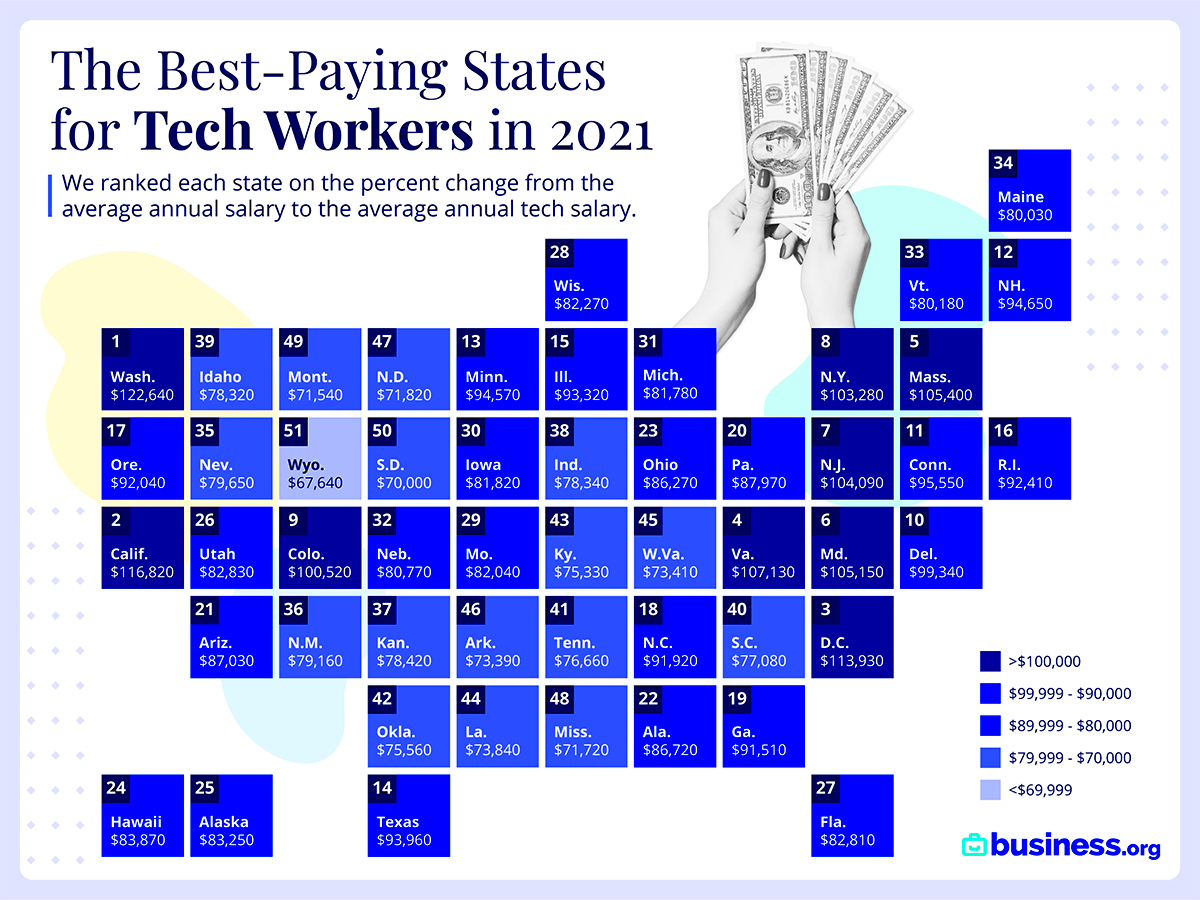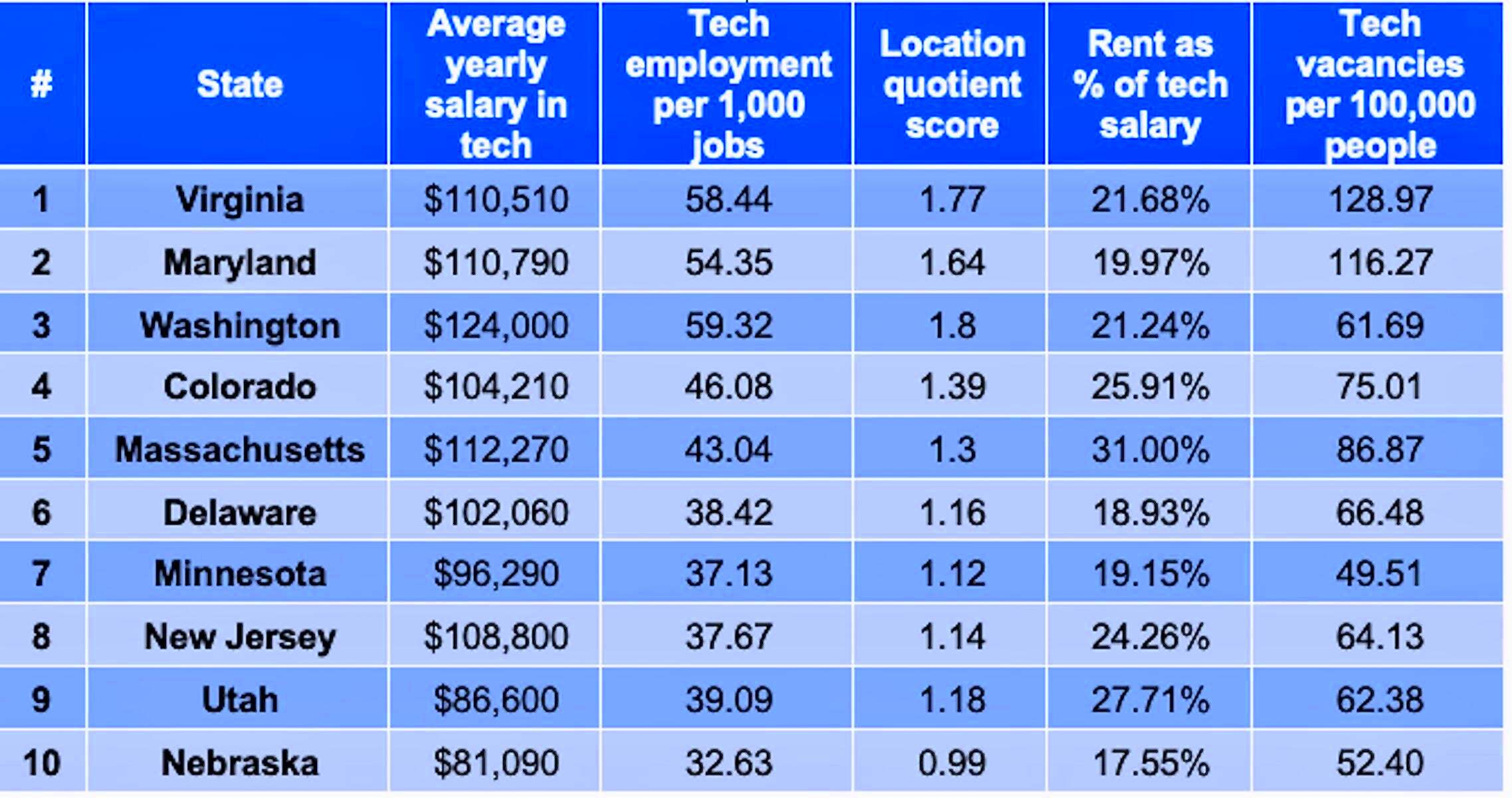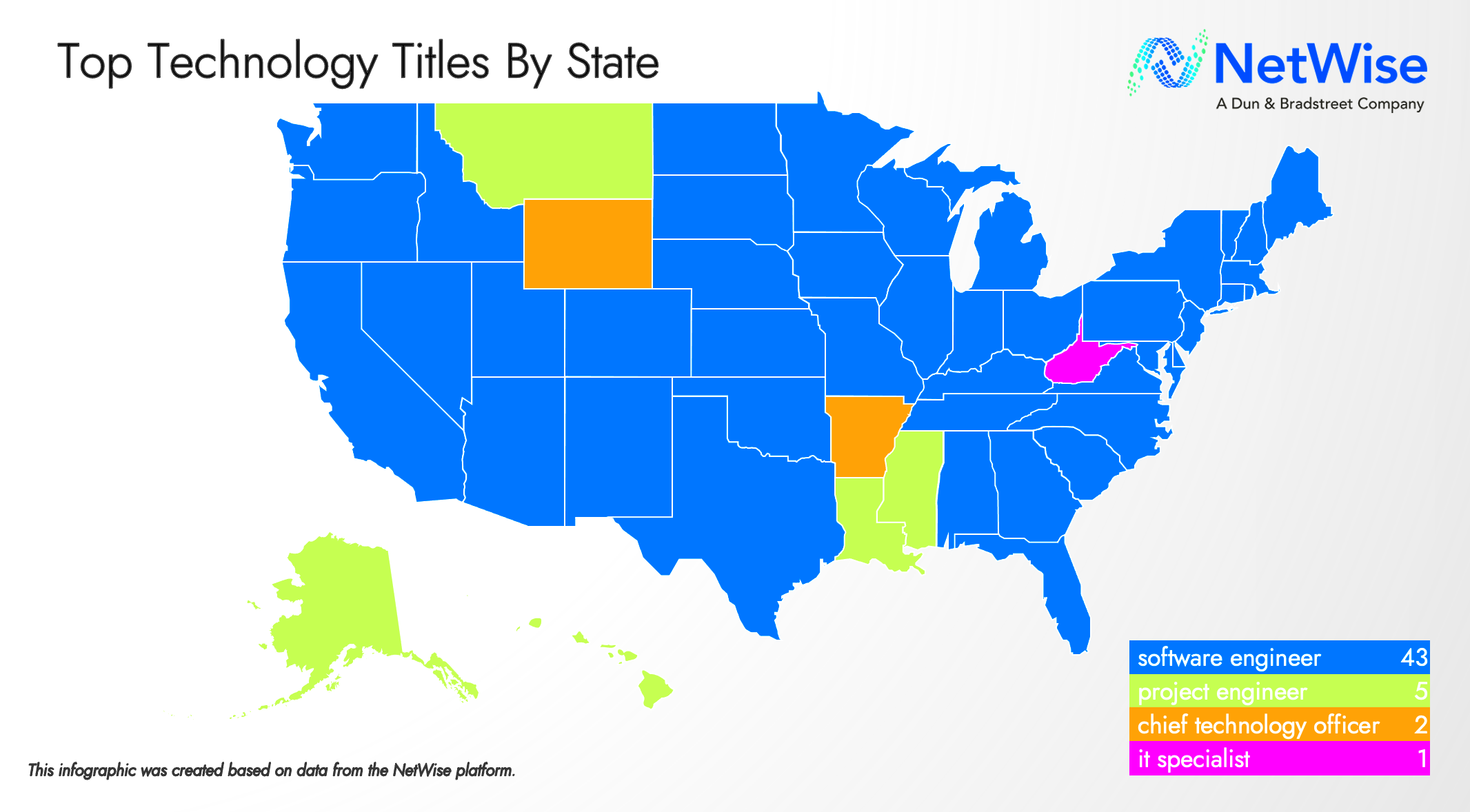In the US, the
technology industry has become one of the most important drivers of growth in recent years. The demand for skilled tech workers is always increasing due to innovations in AI (artificial intelligence), cloud computing and software development. This increase in job opportunities across the United States has been prompted by companies choosing
technology as their only option to compete (Kenney, 2020).Due to the demand for improvement and electronic change, the
technology sector has become increasingly important. Moreover, this growth is not limited to metropolitan areas only, but also encompasses other areas of the globe resulting into wider ranges of choices for individuals seeking entry-level positions or want to progress further in their careers in the tech industry.
What Makes a State Ideal for Tech Opportunities?

Many things are weighed when deciding where to pursue a career in
technology. Below are some pointers that describe an exemplary state for tech opportunities:
- Strong Tech Ecosystem: A well-established network of tech companies, startups, and investors can provide better job options and career growth.
- Access to Education: States with renowned universities and tech training programs often produce more skilled graduates, attracting tech companies to the area.
- Business-Friendly Environment: Lower taxes, supportive regulations, and incentives for tech businesses can draw companies and create more jobs.
- Quality of Life: States with a good balance of work and life, affordable housing, and access to cultural activities attract top tech talent.
- Remote Work Flexibility: States that offer strong internet infrastructure and remote work policies allow tech professionals to work from anywhere, expanding their opportunities.
Top States with Thriving Tech Industries

There are some states that shine due to their advanced
technology options and other chances it brings. Following is a glance on best states for the jobs related to
technology:
| State | Key Tech Hubs | Specializations |
|---|
| California | San Francisco, Silicon Valley, Los Angeles | Software, AI, Hardware, Startups |
| Texas | Austin, Dallas, Houston | Cloud Computing, Cybersecurity, SaaS |
| Washington | Seattle, Redmond | Cloud Services, E-commerce, AI |
| New York | New York City, Albany | Fintech, E-commerce, Digital Media |
| Colorado | Denver, Boulder | Telecom, Software, Aerospace Technology |
In these states, tech professionals looking for Growth and Innovation in their careers have variety of tech companies, research institutions, and thriving startup scene thus suitable places.
Cost of Living vs. Tech Salaries

Making an assessment of a tech job offering entails examining a variety of factors, salary included. One thing you should take note of is that when it comes to salaries in cities with very high living expenses, they might not be as attractive as slightly lower salaries located elsewhere. Balancing these issues will help you choose wisely on your workplace and residence.The relationship between salaries in
technology and the cost of living can be illustrated as follows:
- Salary Variations: Tech salaries vary significantly based on location. For instance, places like Silicon Valley offer high salaries but also have high housing costs.
- Affordable Cities: Many tech jobs are now available in cities with lower living costs, such as Austin or Denver, where you can enjoy a better quality of life.
- Salary Adjustments: Some companies offer salaries that consider the local cost of living, which can make a significant difference in your take-home pay.
- Remote Work Options: Many tech firms are embracing remote work, allowing employees to live in lower-cost areas while earning competitive salaries.
To summarize, it is important to know the cost of living against tech salaries for proper career decisions. For this reason, make sure that you investigate and figure out how much money that you will possibly spend so that you are sure you are not going to be uncomfortable in your new job.
How Education and Innovation Drive Tech Job Growth
The relationship that exists amongst education, innovation and job growth within the technology field is unquestionable. The need for qualified workers keeps increasing due to fast pace of technology changes. This is how education and innovation spur this progress:
- Higher Education Institutions: Universities and colleges play a vital role in training the next generation of tech talent. Many institutions now offer specialized programs in areas like data science, cybersecurity, and software engineering.
- Industry Partnerships: Collaboration between educational institutions and tech companies ensures that curricula are aligned with industry needs, giving students the skills they need to succeed.
- Research and Development: Innovation often stems from research at universities. Breakthroughs in technology frequently lead to new job opportunities in various fields.
- Continuous Learning: The tech industry values ongoing education. Professionals are encouraged to pursue certifications and training to keep up with the latest technologies.
In order to ensure long-lasting expansion as well as the creation of jobs, states could develop an active pool of human resources fitting the requirements of technology companies through investment in education and support for creativity.
Remote Work and Its Impact on Tech Jobs
In U.S., it is true that the way tech jobs are done has been transformed by the emergence of remote work. More firms have been giving flexible working settings resulting to remarkable alterations in the modes and venues of operation for tech experts. Some of these include:
- Wider Talent Pool: Employers can now hire talent from anywhere in the country, leading to a more diverse and skilled workforce.
- Increased Job Opportunities: Remote work options allow more people to enter the tech field, especially those in areas with fewer local opportunities.
- Work-Life Balance: Many tech professionals enjoy improved work-life balance, as remote work reduces commute times and allows for more flexibility in scheduling.
- Cost Savings: Both employees and employers can save money. Employees save on commuting and work attire, while companies can reduce overhead costs related to office spaces.
- Potential Challenges: While remote work has its benefits, it can also lead to feelings of isolation and difficulties in communication. Companies need to establish clear guidelines to ensure collaboration remains strong.
In summary, telecommuting has changed the competitive landscape of technology employment opportunities forever while creating opportunities for individuals and corporations to face more challenges than ever before.
Frequently Asked Questions About Tech Jobs in the USA
With an increasing advancement in technology sector, workmen have lots of questions regarding the same. Some frequently asked questions and their answers include:
What qualifications do I need for a tech job?
- Most tech positions require a bachelor's degree in a related field, such as computer science or engineering. However, many companies also value hands-on experience and relevant certifications.
Are tech jobs in high demand?
- Yes, tech jobs are among the fastest-growing sectors in the job market. As technology evolves, companies are continuously looking for skilled professionals to keep up with the demand.
What is the average salary for tech jobs?
- Salaries can vary widely based on location, role, and experience. However, tech jobs often offer competitive salaries that exceed national averages. For example, software developers in major tech hubs can earn upwards of $100,000 annually.
Can I work in tech without a degree?
- Absolutely! Many tech professionals have found success through alternative education paths, such as coding boot camps or self-study. Demonstrating skills through a portfolio or practical experience can help you land a job.
Is remote work common in the tech industry?
- Yes, remote work has become increasingly popular in tech. Many companies offer flexible work arrangements, allowing employees to work from home or other locations.
How can I stay updated with tech trends?
- Staying informed is crucial in the tech industry. Follow tech blogs, attend webinars, and participate in online courses to keep your skills sharp and knowledge current.
Conclusion: Choosing the Best State for Your Tech Career
There are numerous factors to consider when choosing the best state for your technology career such as job market, expenses and life standards. You should be anxious about what you want and your work goals in order to know the place which is suitable for what you want. However, with the right approach, one cannot only survive but also flourish in the changing world of technology.
 Many things are weighed when deciding where to pursue a career in technology. Below are some pointers that describe an exemplary state for tech opportunities:
Many things are weighed when deciding where to pursue a career in technology. Below are some pointers that describe an exemplary state for tech opportunities: There are some states that shine due to their advanced technology options and other chances it brings. Following is a glance on best states for the jobs related to technology:
There are some states that shine due to their advanced technology options and other chances it brings. Following is a glance on best states for the jobs related to technology: Making an assessment of a tech job offering entails examining a variety of factors, salary included. One thing you should take note of is that when it comes to salaries in cities with very high living expenses, they might not be as attractive as slightly lower salaries located elsewhere. Balancing these issues will help you choose wisely on your workplace and residence.The relationship between salaries in technology and the cost of living can be illustrated as follows:
Making an assessment of a tech job offering entails examining a variety of factors, salary included. One thing you should take note of is that when it comes to salaries in cities with very high living expenses, they might not be as attractive as slightly lower salaries located elsewhere. Balancing these issues will help you choose wisely on your workplace and residence.The relationship between salaries in technology and the cost of living can be illustrated as follows:
 admin
admin








